David Cameron took great pains in his statement to the Commons on the EU budget summit to emphasise the alliances that Britain had formed in trying to keep the budget down. He started by telling MPs that Britain had worked ‘together with like-minded allies from a number of countries’, and repeatedly used words such as ‘together’ and references to ‘we – and others’. This was important as one of the key lines of attack that Labour has tried to make since last year’s veto is that Britain is standing isolated in Europe.
Labour struggled to make an impact, both in Miliband’s response to Cameron’s statement and during the ensuing debate. The Labour leader asked why the Prime Minister had not thanked the House of Commons ‘for sending him into the talks with the strongest possible mandate’, and he referred to splits in the Tory party over the issue of Europe, saying:
‘As we anticipate further negotiations in the months ahead, the wider stance of the Government towards the EU will also have an impact. The Prime Minister has said repeatedly he is in favour of Britain remaining a member of the EU, but why is he allowing his colleagues to take the opposite position?’
Miliband’s frontbench appeared to be trying to emphasise these splits by letting out loud panto-style laughs every time a eurosceptic backbencher pressed the PM on a particular point. Harriet Harman seemed to be checking that the journalists covering the debate were noting this, glancing up at the few remaining hacks in the press gallery with every chortle. But the strategy would have worked better had this been a more bad-tempered debate. As James pointed out on Friday, the summit was, all in all, good for the Prime Minister, although the big test still remains. So Tory backbenchers were not grumbling; in fact, they made special efforts to praise the Prime Minister, with even Peter Bone chipping in with his best wishes. There were still questions from MPs about a referendum, although the majority came from the Labour benches. In response to one from Stephen Doughty, the Prime Minister said this:
‘My view is the problem with an in/out referendum is that both of the options are not really what I would want or, I think, the British people want. I don’t think keeping our membership as it is under the status quo is acceptable, nor do I think walking away from Europe will be a sensible idea. That’s why I think we need a new settlement and new consent for that settlement and that’s what we will be setting out.’
He referred to the speech that he will be giving later in the year, telling Edward Leigh:
‘I think options are opening up to form a different relationship, a better relationship, one that the British people would back and then we’d have to work out exactly how to get the consent for that relationship that I think the British people would deserve.’
Michael Fabricant did pop up to ask a question, but instead of pushing the PM on a referendum, or mentioning his UKIP pact proposal, the party’s vice chair joked that he was ‘rather keen on pacts’, and asked the Prime Minister about the value of countries working together as they did on the European budget. There was a sense that the Tory backbench was holding fire, both for that long-awaited speech unveiling the PM’s stance on Europe, and for the final outcome of the Budget talks, which resume early next year.







Comments